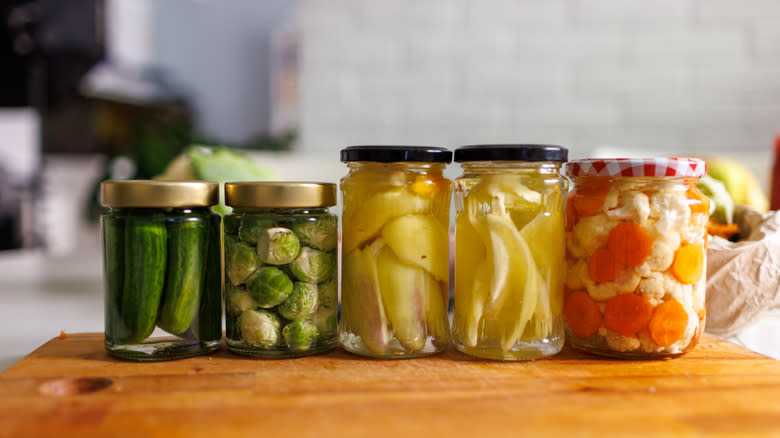The Telltale Signs Of Botulism In Your Homemade Canned Goods

Botulism is an infection caused by a bacteria known as Clostridium botulinum. Improper home canning procedures are the most common cause of this foodborne illness, however, it's actually a rare occurrence, so if you're a home canner, don't panic. That said, it's important to be armed with information about botulism to prevent it and, of course, seek urgent intervention in case of infection.
Unfortunately, botulism doesn't present any obvious telltale signs in the contaminated food: There are no strange smells. The food doesn't taste peculiar, and it doesn't look weird in any way. But taking even one bite of this contaminated food can be deadly. The only way to ensure your food's safety is to follow the proper canning procedures, and the only way to tell your food is contaminated is if you start to feel symptoms. So, if you have doubts about any home-canned goods, it's better to err on the side of caution and discard them without tasting them. Other than that, if you notice any other signs of contamination, discard the food to avoid any other type of food poisoning (even if it may not be botulism). For example, leaking jars, bulging lids, moldy food, spurting or foaming of food on opening the jar, or strange odors are all common signs of spoilage.
Read more: What Happens If You Accidentally Eat Mold?
Symptoms Of Botulism And How To Prevent It

Though there's no way of telling whether food has been contaminated with botulism, it's crucial to know the symptoms in case someone gets infected. Botulism attacks the nervous system of the body, therefore the most obvious telltale signs of infection are drooping eyelids, blurred vision, challenges with swallowing, slurred speech, and difficulty breathing. All these are a result of the various nerve damages causing muscle paralysis. Gastrointestinal symptoms are also common including stomach ache, vomiting, diarrhea, and constipation. If you notice any of these signs and symptoms, go to the hospital immediately because this is a life-threatening medical emergency.
Finally, the best way to avoid botulism is to practice proper canning procedures. It's best to only follow reputable canning instructions and recipes, such as those provided by the USDA that are available on the National Center for Home Food Preservation website. For example, process your foods using the correct canning methods: For high-acid foods, like pickled items and fruits, water bath canning is sufficient, while for low-acid foods, like vegetables and meats, you must use the pressure canning technique. Additionally, use the recommended jars and lids for canning, take note of whether to use hot-pack or raw-pack when canning, follow the required processing times, and understand how to store the canned goods correctly. Do this and your home canned foods will be safe for consumption with no worries about botulism infection.
Read the original article on Tasting Table.


